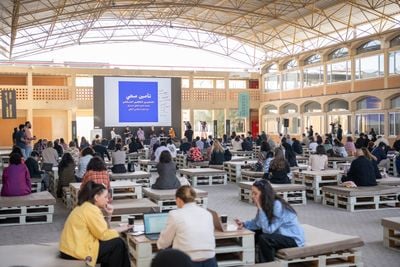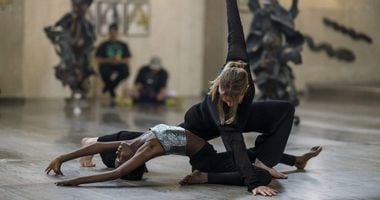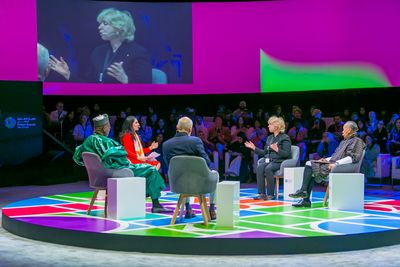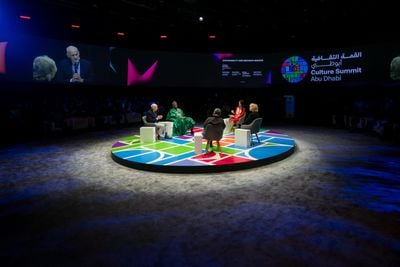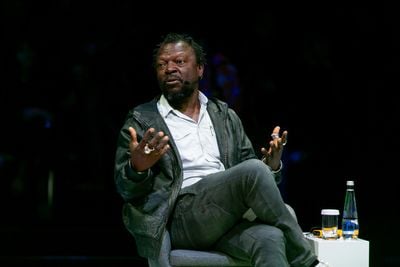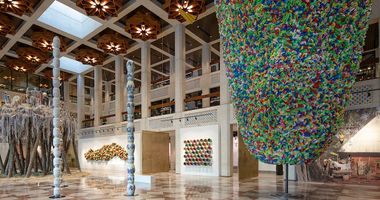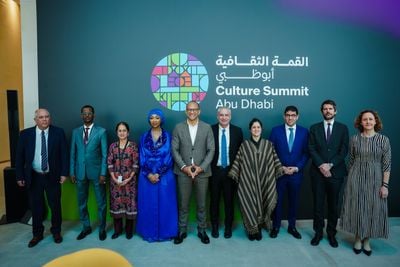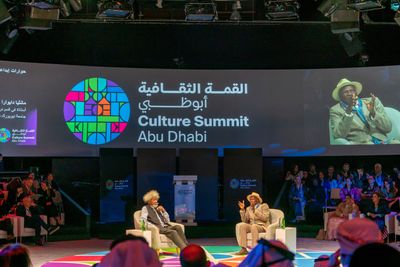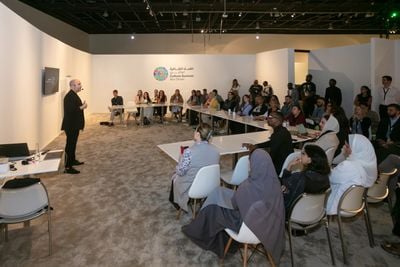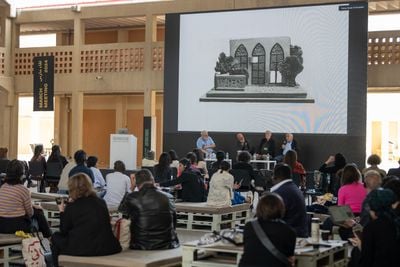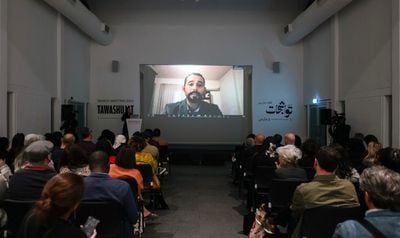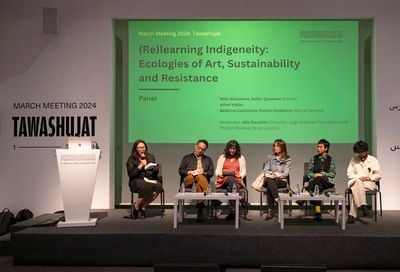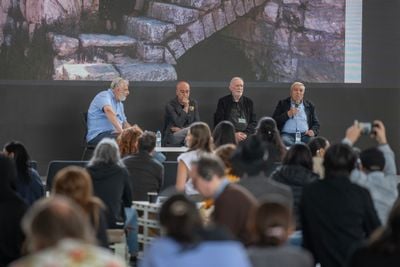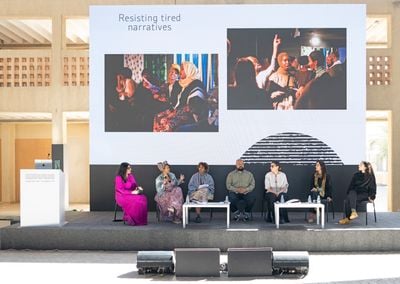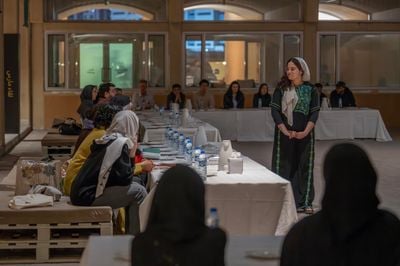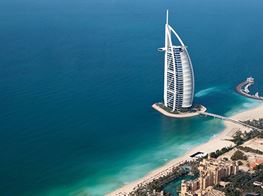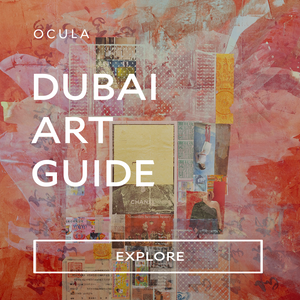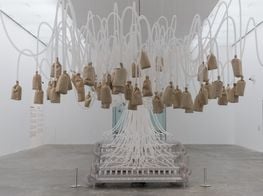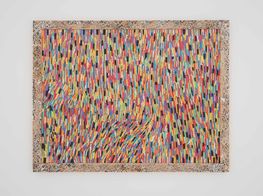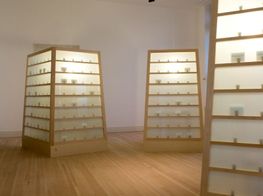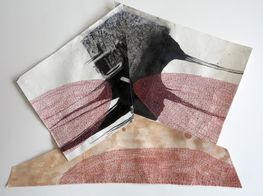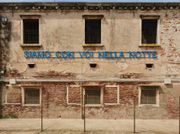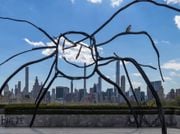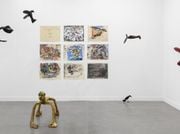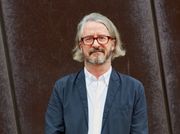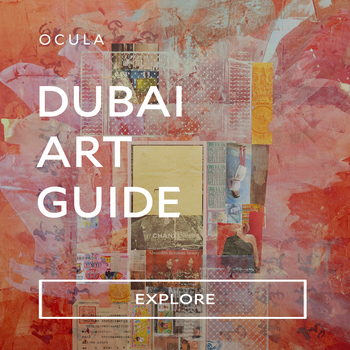From Abu Dhabi's Culture Summit to Sharjah's March Meeting
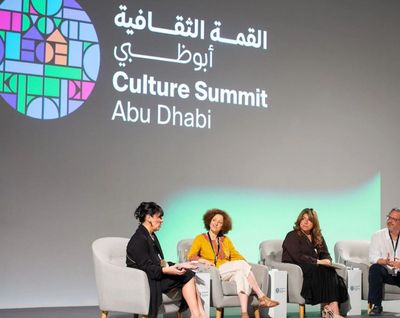
Nathalie Bondil, Noga Arikha, Maral Jule Bedoyan, and Rafael Lozano-Hemmer speaking in the panel 'Objects, Museums and the Mind: Engaging with our Material World' at Culture Summit Abu Dhabi 2024 (3–5 March 2024). Courtesy DCT Abu Dhabi.
When an audience member at the 2024 Culture Summit Abu Dhabi asked Rafael Lozano-Hemmer about the conditions shaping his public art commissions, the artist described an even split between projects shaped from the bottom up and top down.
The spectrum felt fitting for the moment, with three symposia unfolding in the U.A.E. across three of its seven emirates within the space of about one week in March.
On one end, the March Meeting (1–3 March 2024), convened by Sharjah Art Foundation, focused on artists and collectives creating institutions beyond the mainstream, including Emily Jacir and Aline Khoury of Dar Yusuf Nasri Jacir for Art and Research, an artist-run project facilitating educational, cultural, and agricultural exchanges in Bethlehem, the West Bank. Representatives of artist-run collectives that took part in documenta fifteen, including Britto Arts Trust, The Question of Funding, and Ghetto Biennale, also participated.
On the other end, there was the Culture Summit Abu Dhabi (CSAD, 3–5 March 2024), an impressive, diplomatic affair organised by the Department for Culture and Tourism (DCT) Abu Dhabi, with core partners like UNESCO and The Recording Academy, known for its Grammy Awards.
Speakers included singer, songwriter, and producer Babyface and Michael Uslan, the originator of the Batman movie franchise, government ministers and bureaucrats including Kim Campbell, Canada's first female prime minister, plus artists like Daniel Boyd, Radhika Khimji, and Lee Mingwei.
In the middle of it all was Art Dubai's Global Art Forum (GAF), Whether or Not (29 February–1 March 2024), which focused on the link between extreme weather and extreme change. The event included talks and performances by artists, curators, writers, and academics including artist Monira Al Qadiri and curator Maya El Khalil, organised by Commissioner Shumon Basar and curator Nadine El-Khoury.
Between these cultural gatherings in Sharjah and Abu Dhabi, what became palpable was the distance between the immediacy of civilian experience and the long game of politics...
The U.A.E.'s symposia pile-on resulted from the CSAD's postponement in October 2023, the month Hamas launched an attack on southern Israel and Israel responded with aerial bombardment of Gaza, where over 30,000 people have been killed and 130 Israeli hostages remain, according to recent reports.
But while discussions on the Israeli occupation of Palestine at GAF was one of several gestures at Art Dubai 'to foreground the ongoing crisis in Palestine', per Kabir Jhala for The Art Newspaper, and Palestine was front and centre at the March Meeting, Gaza felt like the elephant in the room in CSAD proceedings. Even if Lozano-Hemmer did note, responding to a question on censorship, that participants were not barred from speaking about the subject—despite some audience members suspecting as much.
Abu Dhabi is the capital city of the U.A.E., after all—the state's political, administrative, and diplomatic centre—and the CSAD programme, titled A Matter of Time, showcased that fact. Amid talks involving artists like Pascale Marthine Tayou, who challenged the museum's monopolisation of time in a panel featuring, among others, the Louvre's Donatien Grau, was a roundtable on sustainability and decision-making with former prime ministers from Mali, Canada, Greece, and Bhutan.
George Papandreou—who compared having a gun put to his head during a military coup as a teen to the pressure he felt making a decision on Greece's debt crisis as prime minister—called for a change in political culture. Bhutan's Jigmi Thinley seemed to exemplify that change by describing his nation's holistic approach, with a constitution appointing all citizens guardians of the environment.
On day two, culture ministers from Cabo Verde, Chad, Croatia, Cuba, Mauritius, Morocco, Paraguay, and Spain, advocated for the UN's recognition of culture as a Sustainable Development Goal during the inaugural MONDIACULT Ministerial Dialogue, which expanded on the Declaration on Cultural Policies adopted by 150 states at the MONDIACULT summit convened by UNESCO in 2022.
The session opened with a dialogue between Mohamed Khalifa Al Mubarak, DCT chairman, and Ernesto Ottone Ramírez, Assistant Director-General for Culture of UNESCO, discussing culture's importance to education, creativity, and sustainability. 'Culture is the right building block of any forward-thinking society,' Al Mubarak stated, highlighting Abu Dhabi's efforts to establish itself as a place, with institutions like the Louvre and the Abrahamic Family House, where world cultures meet.
Positioning the Summit within the context of steps 'taken by intellectuals and cultural thinkers from the past', Al Mubarak echoed points made in an earlier talk by filmmaker Manthia Diawara, famed for his documentary portrait of philosopher Édouard Glissant, and Nobel Prize for Literature winner Wole Soyinka.
'People are now displacing the centres of conversation,' Diawara observed, pointing out the existence of centres across the world, and not just in the historic metropoles of the West. Soyinka concurred: 'This unicentrism has been dissipating over the years.'
'People are now displacing the centres of conversation,' Diawara observed, pointing out the existence of centres across the world, and not just in the historic metropoles of the West.
Kaywin Feldman, director of the National Gallery of Art (NGA) in Washington D.C., identified similar dynamics in a panel exploring alternatives to the museum's permanent collection model. Citing predictions that by 2043, the white population in the U.S. will become the minority, Feldman talked about the need for the NGA collection to reflect the nation, noting its present composition of over 90 percent white male artists. 'It will take us years and years and years to change that,' Feldman noted.
Abu Dhabi seems to be making a long bet on this decentring, by investing in the CSAD as a space for diplomatic exchange in an emergent post-Western, post-unipolar world. As CNN's Becky Anderson noted while moderating the Mondiacult sessions, the cultural and creative industries generate revenues of around U.S. 2 trillion annually, per a UN report, and account for about 50 million jobs worldwide. 'Yet the potential of the creative economy remains largely untapped.'
Hence, sessions like 'Monetizing Culture', a workshop led by Adam Roth of The Recording Academy, on building brands through sponsored collaborations, and 'Reimagining Entertainment Diplomacy', which highlighted the summit's engagement with culture in the context of mainstream global capitalism, where fashion designer Rami Kashou elaborated on his use of Palestinian embroidery.
But as former Mali prime minister Moussa Mara pointed out, while culture is indeed important in connecting people, it becomes less so when people are struggling to survive. Referring to the Gross National Happiness metric introduced in Bhutan in 1972, he said: 'Happiness ... is the target, but it is difficult to talk about happiness when someone is angry.'
Over in Sharjah, however, a crystalline anger, rooted in generational struggles against historic injustices, was among the driving forces behind grounded, innovative initiatives, each spearheaded by artists and creatives who have taken it upon themselves to create generative structures of support and community where mainstream institutions, political or otherwise, have failed.
Indeed, if Abu Dhabi was a top-down affair—a multi-chapter policy address, if you will—then the March Meeting, titled Tawashujat (Arabic for 'intertwining'), was a ground-up gathering: a coming together of poetic actions, as highlighted by 'Poems Under the Rubble', a reading by Gazan poet Mosab Abu Toha.
Abu Toha, a New Yorker contributor, made headlines when he was detained by Israeli forces while fleeing Gaza with his family. Via a live link from Cairo, he recited a series of his poems before concluding with 'If I Must Die', a poem written by Gazan scholar and poet Refaat Alareer shortly before he was killed in Gaza by Israeli airstrike alongside six family members, four of them children.
'I haven't been writing a lot,' Abu Toha pointed out. 'It's not easy to write poetry in a time of catastrophe.' Yet by reading his and Alareer's poetry, Abu Toha exemplified the poetic action that Tawashujat amplified throughout its three-day programme: where culture persists, despite everything, as a mode of generative resistance.
Presentations included artist Nida Sinnokrot and architect and conservationist Sahar Qawasmi's introduction to Sakiya, a progressive academy founded in 2016, that bridges art, science, and agriculture to explore sustainable models for living.
Based since 2017 on a rewilded, historic complex in Ein Qiniya, west of Ramallah, a 2018 grant from the A.M. Qattan Foundation enabled Sakiya to develop a residency programme on site. One project Sinnokrot and Qawasmi presented was a sustainable toilet designed with MIT and Harvard students, whose rotating mechanism ensures the even distribution of waste into the ground.
Sakiya's intimate connection to land was echoed in a panel of Palestinian elders, Nabil Anani, Sliman Mansour, Tayseer Barakat, and Vera Tamari: artists who founded the New Visions movement in 1987, amid The First Intifada, advocating the use of natural, local materials.
A sense of rooted, material transmission likewise united speakers in the 'Identity, Memory and Materiality' panel. Ayan Cilmi and Fozia Ismail, founders of dhaqan collective, a U.K.-based feminist art collective of Somali women, described the importance of womxn and community elders to their work. Soledad Muñoz's introduction to the Woven Memory project followed, alongside collaborator Matthew Asaminew, where copper-wire weavings and sound installations created with communities in Chile remember the victims of the Pinochet dictatorship.
María José Murillo delivered that panel's penultimate talk, discussing the Andean roots of a weaving collective she founded with weavers Alipio Melo and Danitza Willka, named 'Noqanchis' after the Quechua word for 'we all', before the session concluded with designer Yasmeen Mjalli, founder of Nöl Collective, which has worked with family-run businesses, artisan workshops, and women's cooperatives across Palestine since 2020.
Discussing Nöl Collective's mission to transform fashion's extractive, vertical model of production into a horizontal, communal process, where 'life isn't lived around production', Mjalli ended with a moving tribute to Mohammad al Jamal. Among the last weavers of Majdalawi cotton, made for centuries in the Palestinian village of Al Majdal until its people were forcibly displaced in 1948, al Jamal is among the numbers killed by Israeli bombardment in Gaza—a loss that recalls the words of Paraguay's culture minister, Adriana Ortiz, who noted during the ADCS's Mondiacult session, that 'without culture, we lose our future.'
'Not Food' by Food in Law founder Shayma Hamad highlighted that practice of preserving living cultures at the March Meeting, by serving Palestinian dishes like maftool while reflecting on inter-generational experiences of loss that have become embedded into flavours like fenugreek. The performance transformed a summit dinner into a solemn ritual of collective mourning—as if to refuse art's instrumentalisation in such contexts as an international conference, where poetry runs the risk of obscuring a lack of political action rather than driving it.
Between these cultural gatherings in Sharjah and Abu Dhabi, what became palpable was the distance between the immediacy of civilian experience and the long game of politics, as the debate over a permanent ceasefire and a meaningful political solution prolongs the live-streamed suffering on the ground in Gaza: a humanitarian crisis that is becoming more urgent by the minute. —[O]

